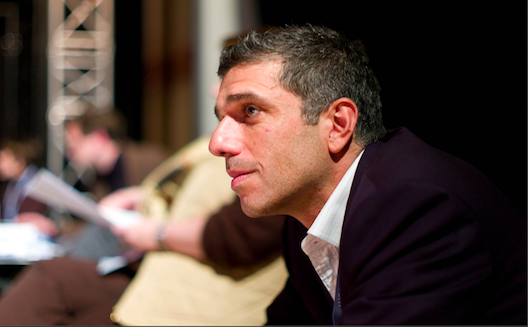How can the region attract more venture capital? Wamda's Q&A with Rabea Ataya


Photo courtesy of Joi Ito.
Earlier this year, Wamda launched its newest initiative, the Wamda Research Lab (WRL), a program that focuses on informing investors, policymakers, and other stakeholders on barriers and solutions for supporting MENA entrepreneurs.
The WRL’s first study, The Next Step: Breaking barriers to scale for MENA’s entrepreneurs, offers insight into the challenges that entrepreneurs face growing their companies, so as to provide policymakers and stakeholders with the information needed to build a supportive ecosystem in the MENA region.
As part of Wamda’s efforts to engage regional entrepreneurship experts with the main findings of the research, we spoke to Rabea Ataya, co-founder of Bayt.com, the biggest regional job search platform.
Entrepreneurs (35%) and experts (43%) said that the lack of venture funding in their countries is a barrier to obtaining investment. (WRL The Next Step)
Wamda: Given the recent growth surge in regional entrepreneurship, why is there still a lack of venture capital funding in MENA?
Rabea Ataya: Venture capital organizations are primarily interested in a return on their investment through successful exits. The region does not offer a substantial track record of exits, for a variety of reasons [including] the fact that capital markets are still fairly young, under-developed, complex in the listing process, and untested by many industries including tech and the internet. The option of going public therefore seems highly limited. Also, there has been little mergers and acquisitions activity to speak of and valuations rarely compare well with other regions.
For investors, while exiting is challenging, entering an investment is equally difficult with limited corporate legal structures available in the region that generally do not follow international standards. Laws that require minimum local ownership, or that do not allow for options plans or dynamic shareholding, lack of bankruptcy protection, director liability, and other legal anomalies all mean international investors are more often than not kept at bay from the region.
Finally, political and economic instability in the MENA region has done little to encourage investors particularly in industries that are not asset based and that require a long-term return.
Wamda: How can entrepreneurs get past these hurdles to attract greater interest from venture capital firms who are wary of investing in the MENA?
RA: Entrepreneurs must help manage the risk for investors. The market risk can be alleviated by having more of a regional if not global market for the business looking for investment. The business risk can be reduced by choosing a business model that has been tried and tested elsewhere and adapting it to local market conditions. The corporate structure risk can be managed by incorporating offshore entities with known legal frameworks and then finding ways to allow for the offshore entity to be present and operational locally. Finally, using professional advisors for legal, accounting, and operational frameworks is helpful as it creates credibility with an investor.
Experts also point to entrepreneurs’ inability to pitch ideas effectively (30%) and their lack of understanding of what investors are looking for (30%) as barriers to investment. (WRL The Next Step)
Wamda: Does the government or the NGO sector have a meaningful role to play in helping aspiring entrepreneurs develop their abilities to pitch their ideas in a way that appeals to investors?
RA: Simple answer: yes. The list of ways is long. However, the primary role of government should be reducing the regulatory hurdles that stand in the way of entrepreneurs.
Wamda: WRL’s study found that companies across the region cited a lack of investment value beyond cash as a challenge to obtaining investment. How can stakeholders help make investment value outside of cash available to entrepreneurs?
RA: As far as I am concerned, cash itself is far too difficult to come by in the region for most entrepreneurs. Let us first solve that issue and then deal with additional value that financial institutions can provide.


